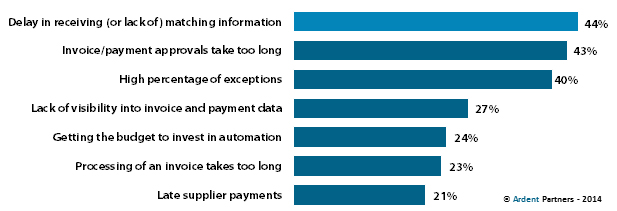Ardent Partners recently published our annual ePayables report, “ePayables 2014: The Quest,” and like all of our payables reports this year the research is geared toward financial managers, executives, and those who aspire to these roles. The report presents a comprehensive overview of the state of accounts payable, as well as focusing on ePayables technology and systems and providing a way for accounts payable teams to benchmark themselves against the Best-in-Class and improve their overall performance.
We spoke with over 190 accounts payable, finance, and other professionals across 25 different industries to give our readers a complete picture of the state of the market. The report is available for free (registration required) at four report sponsor sites: Ariba, Taulia, Basware, and Tradeshift.
Roadblocks to Cost-Savings in Accounts Payable
As with any business function, accounts payable has specific challenges facing it over the long term. It should come as no surprise that these specific challenges relate to manual- or paper-based invoice processes which can, in many cases, be alleviated through ePayables technology such as eInvoicing. In the case of accounts payable, there are three roadblocks that beat out the rest of the issues facing financial teams by a significant margin. These are missing or delayed information, overly long invoice/payment approvals, and high exception percentage.
Roadblock #1: Missing or Delayed Information
The top roadblock by a mere percentage point, missing or delayed matching information (44%) can derail invoice processing quite easily. If you receive an invoice that’s missing a key bit of information – such as the purchase order (“PO”) number – that freezes the invoice until you receive the information. Every moment you spend waiting for that information to come in is a moment you can’t process that invoice, which ends up costing more because you have to go back to the supplier and get the missing information. This can be alleviated through automated PO matching as well as, in some cases, a four-way match between the invoice, the PO, goods receipt notes, and the contract depending on the solution used.
Roadblock #2: Overly Long Invoice/Payment Approval Time
The old adage that “time is money” applies doubly so for AP/finance teams. If your entire job is ensure invoices are paid on time, and in full, then you become a cost center for every moment spent in a holding pattern. At 43%, a single percentage point below missing/delayed information, AP teams facing overly long invoice/payment approval times find themselves unable to provide cost-savings to the business because of process time. Any time-savings on approvals reduces the cost to process an invoice because it cuts down on staff time and any associated costs. One possible solution here is through approval workflows which allow for invoices to “skip” approvers if the invoice isn’t approved within a specific timeframe.
Roadblock #3: High Percentage of Exceptions
Exceptions require manual touchpoints in your AP process. The more exceptions you have, the more frequently you are to require manual intervention in the AP process, which increases staff time and effort and directly increases the cost to the business of processing an invoice. Reducing the number of exceptions overall, which can be caused by any number of issues – wrong payment data, incorrect invoicing, etc. Business can counteract this with required information on invoices, standardizing their processes, and refining their business rules.
Surmounting the above roadblocks won’t automatically create cost-savings in your AP department, but putting in place processes to counteract these challenges through automation will certainly move you toward a more efficient payables operation.



